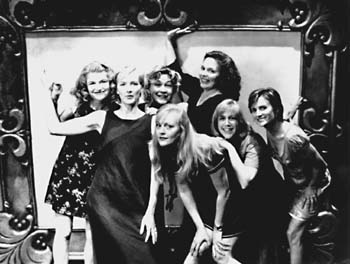![[MetroActive Stage]](/stage/gifs/stage468.gif)
[ Stage Index | San Francisco | MetroActive Central | Archives ]
Multi Medea
Working Women Festival IV issues more gynophilic delights
By Kerry Reid
A theater festival devoted entirely to the work of women artists? Hmm ... I dunno. Isn't that kinda, well, '70s? Not if it's the Working Women Festival, where even a revival of a show from the Dazed and Confused Decade eschews navel gazing and goddess shtick for a satirical deconstruction of gender roles and romance. Now entering its sixth year, the festival has become a showcase for the best local women writers and performers, an entry into the Bay Area for artists from around the country, and an ongoing way of honoring longtime vets and mentoring the next generation.
Founded by il Teatro 450 partners Pam McDaniel and Connie Noble (back when they ran the 450 Geary Studio), the festival continues to surprise every year with the variety and depth of talent it assembles. Last year's headliner, New Yorker Marty Pottenger, took audiences into the heart of the biggest public-works project ever conceived in her solo documentary City Water Tunnel #3--and managed to bring something to the stage that's rarely shown by men or women: real, sure 'nuff working folk who are proud of what they do for a living.
This year, the festival reaches back 30 years for a revival of the San Francisco Mime Troupe's The Independent Female, or, a Man Has His Pride, a retrospective-cum-ironic melodrama about the women's liberation movement. Joan Mankin, who appeared in the original production, directs Joan Holden's award-winning play, which the Working Women Festival and the Mime Troupe will co-produce and tour to schools. (For those who think a comedy about a woebegone gingham-wearing hausfrau and her couture-clad, consciousness-raising friend is out of step with contemporary mores, consider the frightening hold Home Comforts, Cheryl Mendelson's 800-word ode to the joys of housework, currently has on the public imagination--and bestseller lists.)
"I'm really interested in seeing a new generation of performers being handed the traditions of the [Mime Troupe's] performance style and material," says Pam McDaniel. "There's a sense of handing the show to another generation 30 years later, and, with the school tours, it's hitting at exactly the age when these conversations [about gender roles] need to start happening."
Many of the other featured performers this year take a more personal tack in their material. The Sweat Girls, a critically acclaimed performance collective from Chicago (whose I'm Sweating Under My Breasts was a hit a few years ago) return with The Motherlode, a performance piece featuring videotaped interviews the Girls conducted around the country with their real-life moms. (Come to think of it, that sounds a lot like Rita Mae Browne's Rubyfruit Jungle--another ur-text of the women's movement.) Actually, the members interviewed each other's mothers, but not their own, on the premise that people are more likely to be forthcoming when talking to strangers than to offspring.
McDaniel first met Sweat Girl Cindy Hanson when the latter took drama classes from her in a Texas high school. They reconnected 10 years later, and Hanson has performed her own show, Evelyn Dances, in the festival, as well as bringing in her Sweat pals.
Mentoring women and helping them make professional connections is an important behind-the-scenes commitment of the festival. Ten young women spent January and February in an intensive class with designer-in-residence Kate Boyd, learning the basics of set and lighting design, theater technology and stage management.
The personal combines with a thorny political situation in Palestinian performer Emily Mansur Shihadeh's Grapes and Figs Are in Season. Cameron Galloway of SF-based Iron Workers Local 202 Theatre Company, who appeared at last fall's Fringe Festival, brings in a trio of non-assertive, quirky women with unexpected insights into power games in Enjoying the Apple. One goal for the festival producers is to present a variety of performance styles, and that is borne out this year with dancer/performer Deborah Slater's Passing As ... and Other True Fiction, described as "a novel for the stage." Slater, notable for surprising and evocative combinations of dance and performance art, brings in a troupe of six for this piece, which combines text from the performers Barry Orringer and Julie Hebert, with music by David Allen Jr.
McDaniel says she has yet to encounter anyone who questions the relevance of an all-female theater festival. "Even in talking to men who are producers in the field, they acknowledge that there is a continuing need to highlight women's work." (That's certainly the case in the large regional theaters, where, according to a survey last year by Theatre Communications Group/American Theatre Magazine, only 15 percent of the plays produced in those houses were written by women, and only 18 percent of the directors were female.) McDaniel acknowledges those numbers, but points out that there is a marked upsurge in shows by women at small and midsize houses. "All the recent growth and activity is exciting. It's happening. I'd like to think that the Working Women Festival has played some small part. There is an awareness that there is an audience for it" .
[ San Francisco | MetroActive Central | Archives ]
Copyright © Metro Publishing Inc.
![]()

Timely 'Tapestry': The new century births strong women in even stronger roles.
From the March 6, 2000 issue of the Metropolitan.